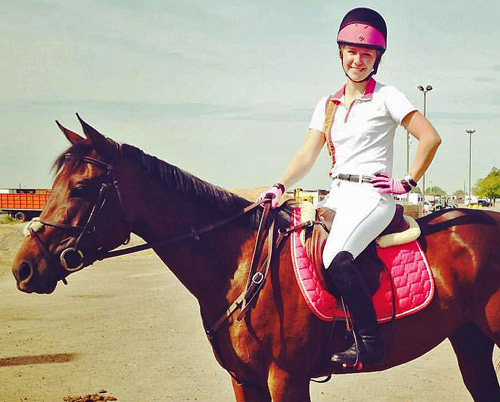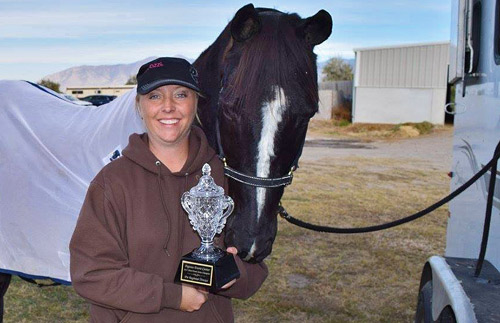No horsing around: English-style riding struggles in Cache Valley
December 18th, 2015 Posted in OpinionStory & Photos by Jillian McCarthy
CACHE VALLEY — Driving along Highway 89/91 into Cache Valley, it is hard to miss all the fence-lined pastures filled with grazing horses. The valley does not lack equine agriculture, but it does lack a robust English riding community. Almost every English riding club, group, sport and community that comes to the valley ends up slowly fading away.

BERC rider Haley Johnson and her horse Tango at an Ogden equestrian event.
The Utah State University English equestrian team, one of the two biggest English riding clubs in the valley, is in jeopardy of losing its club status, says team captain Sarah Price. The team, which does not receive funding from the university, just lost its coach.
“Due to the lack of support, we do not have a strong English riding program,” Price said. “Because of this we had to cancel one horse show this semester and USU will be hosting a home show in the spring with or without a coach.
“This lack of support makes me worried about the future of the English team as a whole,” she said. “I want people to know about our team, or else we may not be able to stick around.”
The English riding team rides a discipline called “hunter seat equitation.” Hunter seat equitation riders jump their horses over fences with precision and speed, and do demonstration exercises emphasizing the horse and rider’s manners, fluid movements and correct jumping style, according to the United States Equestrian Federation. There are many variations of English riding, and hunter seat equitation is only one. Others include dressage, eventing (or 3-phase) and show-jumping.
USU’s English riding team is not the only riding club in the valley that has suffered doldrums over the years.
“Back when I was young, we had an English 4H club of 20 to 25, and we were a strong team,” said Stacey Hess, a member of the Bridgerland English Riding Club (BERC). “We had a lot of amazing instructors with great knowledge that helped with camps and shows.”
“At that time, Logan had the facilities with a cross country course that we could hold shows very successfully at,” she said. “A couple years passed and things started to change; we still had some riders in the valley and opportunities to participate in clinics, but the shows had gone away.”
But even though there is a lack of an organized English riding community in the valley, there is not a lack of English riders.
“The shocking part is how many people wish there was more going on,” said Kelli Brown, an English riding instructor who recently moved to the valley. “Every time I turn around I have more people asking me for lessons, and I can see how many people crave knowledge and more of a riding community.”
But there aren’t enough English riding trainers, coaches, facilities and resources in Cache Valley, Brown said. Without an English riding barn, there is no place of community, without the leaders there are no events and without the trainers and coaches there is no recognition.

BERC member Stacey Hess and her horse Java after placing in a 3-phase eventing show in Grantsville.
“What this valley is lacking is leaders that are willing to put in the time,” Brown said. “I don’t know a single coach in the valley that competes, or that has a program.”
Another obstacle is that English riding is a very expensive sport. English equestrians have to compete with the already dominant Western riders in the valley for places to ride.
“We live in a place that is taught to be very frugal with their money,” Hess said. “We also have no support for this riding discipline in our valley.”
“I dabbled in it a little bit trying to get English riding a spot in the Fair Week, during the Logan County Fair,” she said. “I was successful, but we had to team up with 4H, which makes it difficult to hold and run an English riding event because we cannot do things our way and we have to go by all the 4H rules and regulations.”
The lack of resources keeps some of the riders in the valley isolated, and makes it hard for them to come together to build a community.
“I still find it is hard to expand and learn more about opportunities or how to advance your career and show at higher levels without having a group here to join forces with,” Hess said.
It all boils down to people who are willing to take on the work and commitment of bringing more English riding events, creating a community and raising funds for facilities, events and shows that will allow this community to thrive.
One BERC member saw a need for more of a community and started organizing events to get things going.
“What started out as simply making friends and riding with them turned into a personal mission to bring these people together and create more English-riding opportunities,” said Haley Johnson, a BERC member and USU equine major.
Riders enjoy the atmosphere of English riding and the ability to work and create a closer bond with their horses.
“I personally like riding English better than Western because of the people that engage in the sport, I also love the competitions as well as the connection I have with my horse,” Hess said. “The respect I have for my horse shows in the respect I receive back from him.”
There are other riders that enjoy both Western and English riding but tend to lean more toward one or the other.
“While I like both English and Western disciplines, I love dressage and see it as the foundation to all great training,” Johnson said. “I believe 3-phase eventing is the ultimate horse sport and love it most of all. If I had been started Western, I probably would have followed the reined cow-horse three-phase events.”
English riding coaches also love educating and sharing their experience with other riders. It is a family of people that love the community and being able to learn and grow through their own experiences as well as others.
“I think the most rewarding aspect of coaching is seeing riders become more confident and competent in something they love,” said Jocelyn Cuthbert, the temporary coach for the USU English riding team. “Working with horses can be very frustrating, difficult and even scary at times, but it is also very rewarding and can teach riders invaluable lessons that apply to all aspects of their life.”
TP
Tags: English horseback riding, equestrian, Haley Johnson, Joselyn Cuthbert, Kelli Brown, Sarah Price, Stacey Hess

Sorry, comments for this entry are closed at this time.